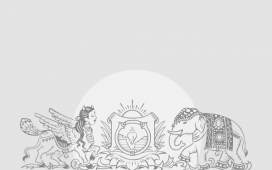The protest at the Johns Hopkins University grew louder and larger on the second day.
Students took turns on the microphone Tuesday night to continue to call on the school to cut ties with Israel during Baltimore’s version of a nationwide campus protest movement that has resulted in mass arrests elsewhere.
“Dissolve. Divest. We will not stop. We will not rest,” the crowd chanted.
The peaceful encampment launched Monday afternoon around 4 p.m. on “The Beach,” a grassy hill by the intersection of Charles Street and University Parkway. The crowd peaked at over 200 people Tuesday night.
Tables near the front offered free food and drinks as well as hygiene and medical supplies. A sign with a phone number to call if arrested was tied to a tree. One speaker shared tips on what to say when confronted by law enforcement. Baltimore Police Department officers were not visible Tuesday evening as a handful of campus security and university police officers watched from a distance.
Early Tuesday morning in a message from President Ron Daniels and Provost Ray Jayawardhana, the university said students agreed the assembly would cut off at 8 p.m. Student groups on social media called that claim a “gross misrepresentation” of the conversation.
Around 9 p.m. Tuesday, protesters began to set up tents to stay overnight for the second consecutive night while speakers continued to lead chants on the microphone.
Tuesday evening, a university spokesperson said anyone in the encampment past 8 p.m. was violating school policy and trespassing.
“We have been clear that the consequences of violating our policies and creating unsafe conditions include academic discipline, which is determined by university officials, and trespass, which is handled by local law enforcement,” the spokesperson said.
Pro-Palestinian protest at Johns Hopkins University resumes, demands institution divest from Israel
The mayor’s office has not responded to questions about how it would direct police to act in response to the protest. Last week, police in Washington, D.C., rejected the George Washington University officials’ pleas to clear a small encampment of peaceful protesters.
Students are demanding the university, which has 5,253 undergraduates enrolled, divest its endowment from companies that support Israel, including Elbit Systems, BlackRock, Northrop Grumman, Palantir, General Dynamics, Lockheed Martin and Google. Students are also demanding the school reveal all financial ties to Israel, lobbying efforts to increase militarized spending, and an account of the use of weapons and military technology developed at Hopkins, protest organizer the Hopkins Justice Collective said in a news release. University board of trustees member Gary Roughead is also on the board of Northrop Grumman.
In addition, the students are demanding the university disband a cooperative degree program with Tel Aviv University and stop accepting United States Department of Defense funding to develop weapons through the applied physics lab. In August 2022, the Department of Defense said it awarded Johns Hopkins an over-$4 billion contract for “research, development, engineering, and test and evaluation for programs throughout the Department of Defense.”
Israel has killed more than 34,000 Palestinians in the Gaza Strip, according to the local health ministry, and put over a million people at risk of starvation during widespread famine, according to the United Nations. Israel’s strikes have been in response to an attack Oct. 7 by Hamas-led terrorists embedded in Gaza that killed 1,200 people, mostly civilians, and took about 250 others hostage, according to The Associated Press.

Dillon Mullan/Staff
A banner that states “Free Palestine” is draped over a sign for the Johns Hopkins University on Tuesday night.
Elsewhere around Baltimore on Tuesday, Goucher College President Kent Devereaux ordered for protesters in a “small number of tents that have emerged on the academic quad” to “immediately remove their tents and abide by the campus demonstration policy.”
A reporter was denied entry into the campus Tuesday by a security officer, who said the institution was trying to ensure that nonstudents did not enter. The encampment at Goucher was still in place Tuesday afternoon, and vehicular access to the campus was limited to curb people from outside the campus community “interfering with students’ studying during the last two weeks of the semester,” a spokesperson said.
Around 1,000 people have been arrested at Pro-Palestinian protests at universities since New York Police arrested over 100 demonstrators at Columbia University on April 18, according to the AP. Tuesday night, on the 56th anniversary of a similar police action against students protesting racism and the Vietnam War, hundreds of police officers stormed the Manhattan campus to arrest protesters, according to the AP.
Dozens were arrested at the University of Texas-Austin on Monday while police in riot gear cleared an encampment at Boston’s Northeastern University last weekend and arrested around 100 people, according to the AP.







